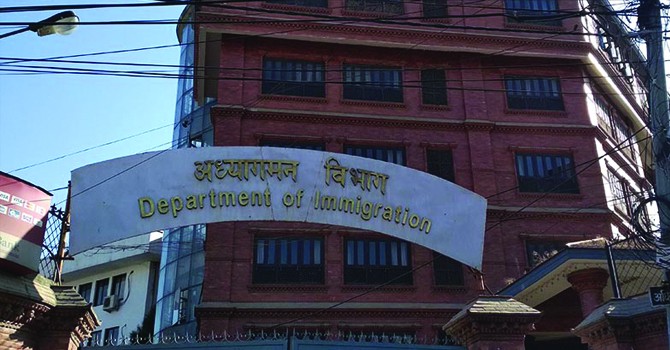Foreigners with dubious visa status under scanner

By Purushottam P. Khatri
Kathmandu, Dec. 4: Foreign nationals, who are in Nepal on non-tourist visas, are lately under tight surveillance of the immigration offices, the government officials said on Tuesday.
“Foreign citizens who came to Nepal on non-tourist visas and engaged themselves in various jobs like preaching religions visiting various parts of the country and cultural functions are under our tight surveillance,” Director and Information Officer at the Department of Immigration (DoI) Ram Chandra Tiwari told The Rising Nepal.
Some foreign nationals suspected of trying to convert the Nepali people into their religion were apprehended and deported according to Nepal’s immigration law, he said. “During the fiscal year 2018/19, the Immigration deported three foreign nationals who were arrested for their activities which contradicted their visa nature,” Tiwari said.
In November 2018, two Japanese women, Mari Iruka and Yasuko Oba, were arrested from Padampur, Butwal, for supposedly trying to convert people into Christianity by offering ‘various inducements’. They were later deported.
Earlier, the locals had taken the two Japanese women under their control as they felt that the two were spreading false information about Hinduism. The two women, who spoke Nepali fluently, were in Nepal on tourist visa.
Also in October 2018, Australia’s Katiya Graham was arrested from Bardiya’s Gulariya and later was deported on the same charge. Graham, who was on student visa while studying at Pashupati Campus in Chabahil, was arrested during a door-to-door evangelizing campaign in Gulariya. All three were barred from entering Nepal for five years.
According to the DoI record of the deportation of foreign nationals of the last one year (2018/19), upon the recommendation of the DoI, the Ministry of Home Affairs had deported 638 foreign nationals who were held guilty in various charges and faced jail sentences for overstay and in pedophile cases.
Of the total deportation cases, 540 foreign nationals were deported to their respective countries for overstay or without having work permit visas. The second highest deportation was of those relating to the case of possessing forged passports. Likewise, 11 were deported in the case of gold smuggling, according to the record of DoI.
According to the rule, if a foreigner overstays without renewing tourist visa for more than 150 days, s/he shall be expelled from the country. The offender is also liable to face fine of three USD per day and an additional fine of up to Rs. 50,000.
Any foreign national residing temporarily in Nepal is not allowed to engage in any activity other than the purpose for which the visa was issued. Tendency of overstaying among the foreigners has increased by taking advantage of the absence of a monitoring mechanism.
Director Tiwari said as many as 97 foreigners were deported upon their release from jails, after serving sentence on various criminal offenses, including paedophillia, theft, drug smuggling, fake currency, arms and ammunition, foreign exchange, banking fraud, kidnapping, hundi business, human trafficking, telecommunications and forgery of passports and visas.
Those facing expulsion included citizens of Bangladesh, People’s Republic of China, Pakistan, Russia, Germany, Korea, France, USA, Britain, Italy, Israel, Australia, Canada, Uzbekistan, Portugal, Taiwan, Switzerland, the Netherlands, Saudi Arabia, Poland, Iran, New Zealand, Malaysia, Peru and Denmark.
Thousands of foreigners, mostly Chinese and Bangladeshis, are suspected of living illegally in Nepal.
According to the Ministry of Home Affairs, the DoI was working in collaboration with the Ministry of Culture, Tourism and Civil Aviation, district administration offices, police and tourism entrepreneurs to effectively monitor the activities of the foreigners visiting Nepal.
Foreign Nationals Monitoring Directives recently endorsed by the government envisages a central level monitoring and regulation committee led by DoI Director General, and a district level committee led by Chief District Officer (CDO) to keep tab on them and control their illegal activities in Nepal.
Recent News

Do not make expressions casting dout on election: EC
14 Apr, 2022
CM Bhatta says may New Year 2079 BS inspire positive thinking
14 Apr, 2022
Three new cases, 44 recoveries in 24 hours
14 Apr, 2022
689 climbers of 84 teams so far acquire permits for climbing various peaks this spring season
14 Apr, 2022
How the rising cost of living crisis is impacting Nepal
14 Apr, 2022
US military confirms an interstellar meteor collided with Earth
14 Apr, 2022
Valneva Covid vaccine approved for use in UK
14 Apr, 2022
Chair Prachanda highlights need of unity among Maoist, Communist forces
14 Apr, 2022
Ranbir Kapoor and Alia Bhatt: Bollywood toasts star couple on wedding
14 Apr, 2022
President Bhandari confers decorations (Photo Feature)
14 Apr, 2022











